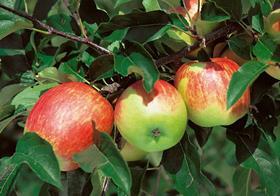
Abundant sun and high temperatures over the European summer, which in some cases turned into spells of drought, have led to a revision of this season's topfruit forecast by the World Apple and Pear Association (WAPA).
The new apple figure is set at 12.5m tonnes, down from the Prognosfruit forecast of 12.6m tonnes that came off the back of favourable weather events all over Europe in spring and early summer.
The 2018 EU crop is dominated by the ongoing growth of, among others, Polish production, and the return of the Central European member states to a normal crop after last years’ frost.
However, other leading member states such as France, Italy and Germany are reporting a moderate crop.
Germany experienced higher temperatures than normal, with a continuous period of drought, which has impacted the apple crop. The crop forecast from August decreased by 6 per cent from 990,000 to 934,000 tonnes, with some regions being more affected than the others. Only northern Germany had enough water in the orchards by means of sprinkling, whilst the other regions were too dry.
The Czech Republic indicated a decrease of 15 per cent compared with their initial forecast to 128,000 tonnes for apples, and a decrease of over 25 per cent compared with July to 8,000 tonnes for pears. The harvest has been affected by the continuous drought since April and high temperatures, which led to small sizes and an increased number of fruits destined for processing: up to 65 per cent for apples and 33per cent for pears.
France has modified its initial forecast slightly downwards from 1.5m tonnes to 1.48m tonnes for apples and from 135,000 tonnes to 134,000 tonnes for pears.
Italy confirmed the forecast made at the beginning of August, noting that, in general, the quality, sizing, and colouring was good, under influence of good weather conditions during harvest. Certain regions were hit by hail, which could lead to a higher quantity of fruits going to processing.
Belgium had already modified its forecast downwards before the publication of the Prognosfruit report at the beginning of August, taking the drought into account.
The Netherlands had a high initial forecast and planned to revise its figures downwards. However, precipitation during the harvest led to a crop of good quality and quantity.
Poland indicated that the yield for apples might be even higher than the initial forecast, which could even out the slightly lower figures from the other contributors as indicated above. However, a bigger proportion of Polish apples would go to the processing industry. Overall, the final volume harvested could also be influenced by shortage of work force and storage.
In the meantime, the US apple outlook has forecast the figure of 4.88m tonnes for apple, which is slightly down from the initial forecast of 4.91m tonnes, while the Canadian forecast is set at 341,249 tonnes.
'Overall, the drought and heat in northern, western and eastern Europe have had an impact on the forecast for apples and pears, with a current difference of 100.000 tonnes downwards,' WAPA reported.' However, these figures are still subject to change as they only reflect the revised forecasts from the major contributors that provided information.
'WAPA will continue to monitor the developments in the fresh and the processing markets, and will publish more detailed updated figures for the northern hemisphere in November 2018, before releasing the consolidated figures in January 2019.'



